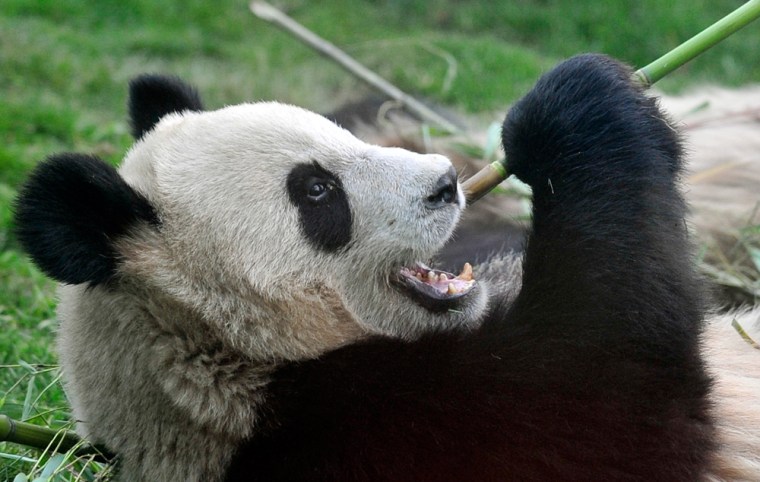The world's most famous panda reserve wants to find a new home after its current one was badly damaged by this month's deadly earthquake in China.
"It's better to move, I think," Zhang Hemin, the chief of the Wolong Giant Panda Reserve, said by phone Thursday.
A state-run news agency also reported Thursday that another panda reserve, China's largest, has had to call off patrols and its annual panda census because of the quake's aftershocks.
The Wolong reserve is just 20 miles from the epicenter of the May 12 quake, which has killed more than 68,000 people, including five reserve staff members.
One panda remains missing. Conditions remain so bad that the Chinese government last week arranged an emergency food shipment of about 5 tons of bamboo for the 47 pandas still at the reserve. Many panda enclosures were heavily damaged.
"What I'm worrying about are secondary disasters, such as severe aftershocks," Zhang said. "The road is easily blocked by rocks falling from the mountain. There would be no way to get the food in."
The reserve's location in a damp, narrow valley several hours' drive from the capital of Sichuan province made it an easy target during the 7.9-magnitude quake, which tossed down boulders the size of cars. Most of the staffers, tourists and pandas were outside at the time.
According to an article by the only journalist at the reserve during the quake, Shanghai Morning Post's Wu Fei, some pandas froze and looked at the sky, not moving even when their handlers tried to get them going.
Other handlers picked up baby pandas by the scruff of their necks, one in each hand, and ran, Wu said in his article published May 18.
The on-the-spot rescue was complicated because some of the pandas were in what the Chinese call their "falling in love period," being particularly excitable and prone to attack, reserve researcher Heng Yi told Wu for the article.
Some pandas have been moved to another breeding center in the Sichuan capital, Chengdu, and eight were flown to Beijing last weekend for a previously scheduled six-month stay at the Beijing Zoo for the Olympics.
Meanwhile, any move of the Wolong reserve has to wait for a damage assessment by geologists, Zhang said.
Another panda reserve, China's largest, has been forced to cancel its patrols and annual panda census because of aftershocks and blocked roads, the state-run Xinhua News Agency reported.
"We've not been able to get into the heart of the forests to check if the giant pandas are OK," Huang Huali, deputy director of the Baishuijiang Nature Reserve Administration, told Xinhua.
The reserve is in Sichuan and neighboring Gansu province and is about 62 miles from the quake's epicenter.
The rare panda is a powerful symbol of China. About 1,590 pandas are living in the wild, mostly in Sichuan and the western province of Shaanxi. An additional 180 have been bred in captivity in hopes of increasing the species' chances of survival.
